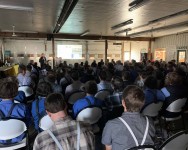2025 Finger Lakes Auction Winter Growers Meeting
Event Details
Date
January 2, 2025
Time
8:30 AM - 3:00 PM
Location
Finger Lakes Produce Auction
3691 NY-14A
Penn Yan, NY 14527
Cost
FREE!
Host
Cornell Vegetable ProgramJudson Reid
585-313-8912
email Judson Reid

At this grower-focused meeting, ag industry experts will discuss pest control in vegetables, weed management strategies and best practices, seed germination, an introduction to foliar nutrient uptake in vegetables, and grouping flowers by growth needs. Plus we'll hear from a grower panel from Kutztown Produce Auction, moderated with NYS specific pest control from Judson Reid.
2.25 DEC recertification credits will be offered in categories 10, 1a, 23, and 24.
AGENDA:
8:30 AM Coffee, Re-certification Credits, visit vendors
9:00 Welcome and Auction Updates -- Nelson R. Hoover, Chair FLPA Board of Directors.
How did the new space work in 2024? What can we expect in the new year for processes?
9:15 Grouping flowers by growth needs -- Professor Neil Mattson, Cornell University
Neil will share research on the influence of water quality and nutrient availability, temperature, light, and abiotic stress for the production of high quality floriculture crops. Growth needs will be defined using nutrients, water, and energy.
10:00 Tomato and Pepper Insect and Mite Management -- Steve Bogash, retired ProFarm Inc.
Steve will discuss integrated management of common pests in tomatoes and peppers with a focus on cultural and microbial insecticides.
10:45 Seed germination; quality plants begin on Day 1 -- Jeff Werner, Rupp Seeds
Jeff will cover how to seed, germinate and care for young transplants from flowers to vegetables.
11:15 Introduction to Foliar Nutrient Uptake in Vegetables, Greenhouse Crops, and Small Fruit (Part 1) -- Steve Bogash, retired ProFarm Inc.
Steve will cover foliar nutrient application for common produce auction crops; what, how and when to apply different fertilizer solutions.
11:45 Updates from Sponsors and Vendors -- Three seed and ag input companies will have 5 minutes to share product news.
12:00 Lunch
1:00 Weed control for Plasticulture Vegetables PART I: Are herbicides in row middles a good idea? -- Elizabeth Buck, Cornell Vegetable Program
Herbicides can be used between plasticulture vegetables, but careful attention must be paid to label requirements including pre-harvest intervals and crop safety considerations. Elizabeth will cover legal, effective options for produce growers.
1:45 Weed control for Plasticulture Vegetables: PART II: Park the Sprayer! You can use living mulch in row middles! -- Judson Reid, Cornell Vegetable Program
Cover crops, or 'living mulch' are an alternative to herbicides. We will share updates on cover crops as a tool to combat weeds, and interactions with disease, insects and soil health.
2:15 Grower Panel - Kutztown Produce Auction growers, moderated with NYS specific pest control from Judson Reid
We have invited our friends to discuss their techniques in sweet corn production, including insect control, pumpkins, weed control, tomatoes and more. Bring your questions!

Upcoming Events
Orleans Regional Winter Vegetable Meeting
February 9, 2026
Albion, NY
Topics include: Breeding and evaluating tomatoes to control disease and improve yield, jar testing and ensuring spray water quality, breaking down organic matter, FSMA updates and Q&A with Ag & Markets, and industry updates. Includes hands-on learning, coffee break, and sponsor booths.
DEC credits available: 1.0 in CORE plus 0.5 in 1a, 10 or 23
African Eggplant Participatory Breeding Kick-Off
March 5, 2026
Join us to learn about the Cornell African Eggplant Research Project and learn how you can participate! African eggplant, also known as Bitterball, Garden Egg, Kittley and other names, is an important crop for many members of our community with heritage from regions such as sub-Saharan Africa, Southeast Asia, and Brazil. Since 2024, the Cornell African Eggplant Research Project has been collaborating with growers and community partners across New York to develop high-quality varieties adapted to the Northeast U.S. In this meeting, we will share information about growing and preparing African eggplant, highlight our research to date, and invite partners to collaborate with us in our 2026 participatory breeding and variety selection efforts.
COST: FREE! You must pre-register to receive the Zoom link.
Managing the Invasive Swede Midge Webinar
March 6, 2026
Swede midge is an invasive fly that causes serious economic losses to brassica crops. Due to its small size and hidden feeding habits, swede midge is often called an "invisible pest" and damage may be misdiagnosed. In this webinar, we will review the swede midge life cycle and crop damage symptoms, current management recommendations, new research findings, and highlights from on-farm case studies with a focus on organic management.
1.75 DEC pesticide recertification credits in categories 1a, 10, and 23.


































